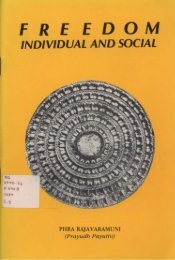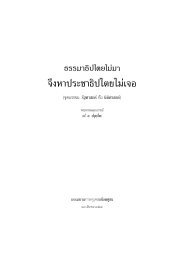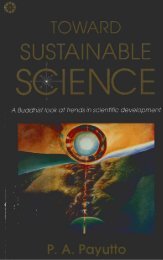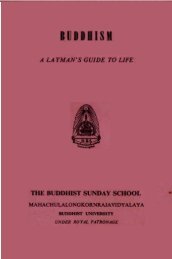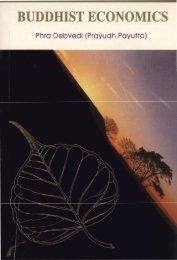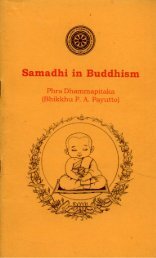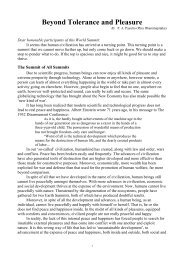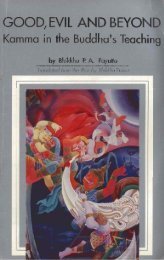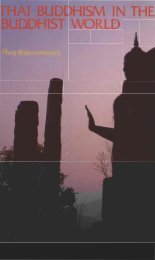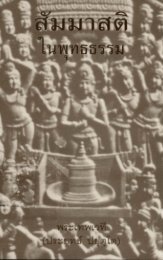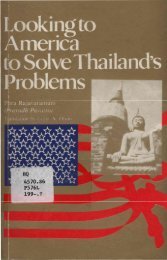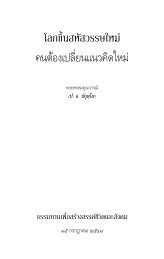- Page 1 and 2:
The Tree of Enlightenment Dr Peter
- Page 4 and 5:
CONTENTS About the Author..........
- Page 6 and 7:
Part ree he ajrayana Chapter Twenty
- Page 8 and 9:
out the uthor P eter Della Santina
- Page 10 and 11:
uthor’s ote F rom 1983 to 1985 wh
- Page 12 and 13:
ship. Finally, I want to thank all
- Page 14 and 15:
CHAPTER ONE uddhism: odern erspeiv
- Page 16 and 17:
mind, while in traditionally Buddhi
- Page 18 and 19:
is story illustrates the practical
- Page 20 and 21:
one’s own personal experience is
- Page 22 and 23:
e procedure adopted here is analyti
- Page 24 and 25:
transformation, whereas in Buddhism
- Page 26 and 27:
emained separate and distinct, but
- Page 28 and 29:
coveries at Mohenjo-daro and Harapp
- Page 30 and 31:
Whereas in the religion of the Indu
- Page 32 and 33:
look at some of the prominent facts
- Page 34 and 35:
Buddhism was a protest against, or
- Page 36 and 37:
CHAPTER THREE e ife of the uddha N
- Page 38 and 39:
inated by the correctives of renunc
- Page 40 and 41:
Siddhartha, being the faster runner
- Page 42 and 43:
permanently put an end to suffering
- Page 44 and 45:
CHAPTER FOUR e our oble ruths W ith
- Page 46 and 47:
the formula of the Four Noble Truth
- Page 48 and 49:
measures to remedy the disease. Suc
- Page 50 and 51:
lives often brings us into contact
- Page 52 and 53:
all right, but it would be still be
- Page 54 and 55:
as we take the tree stump to be a p
- Page 56 and 57:
ply because we have not experienced
- Page 58 and 59:
emedy the situation here and now, t
- Page 60 and 61:
earth, water, fire, and air, the su
- Page 62 and 63:
overly tight string produces an unp
- Page 64 and 65:
CHAPTER FIVE orality I n Chapter 4
- Page 66 and 67:
you will find that the basic rules
- Page 68 and 69:
In this context, right speech impli
- Page 70 and 71:
ever, some of the developments in r
- Page 72 and 73:
Very briefly, these are the origin,
- Page 74 and 75:
CHAPTER SIX ental evelopment I n th
- Page 76 and 77:
ing the way we experience things an
- Page 78 and 79:
itself. Indeed, if you look at the
- Page 80 and 81:
Recognizing the value and importanc
- Page 82 and 83:
the mind on the object without dist
- Page 84 and 85:
CHAPTER SEVEN isdom W ith this chap
- Page 86 and 87:
Buddhism, faith is preliminary and
- Page 88 and 89:
when you are sure you have understo
- Page 90 and 91:
will experience the happy effects o
- Page 92 and 93:
greed, anger, envy, and jealousy. I
- Page 94 and 95:
of samsara, the cycle of birth and
- Page 96 and 97:
others are less fortunate, why some
- Page 98 and 99:
In the same way, according to the l
- Page 100 and 101:
Here we can see at work the princip
- Page 102 and 103:
Similarly, there are five alternati
- Page 104 and 105:
in heaven can we escape our karma.
- Page 106 and 107:
CHAPTER NINE ebirth I n this chapte
- Page 108 and 109:
convincing case for the reality of
- Page 110 and 111:
death, we are reborn at every momen
- Page 112 and 113:
ey suffer from the human beings who
- Page 114 and 115:
ealms is undesirable. e three lower
- Page 116 and 117:
continue to circle endlessly among
- Page 118 and 119:
tinuity of cause and effect exists,
- Page 120 and 121:
On the basis of the Buddha’s own
- Page 122 and 123:
in this life result in rebirth in a
- Page 124 and 125:
less lives, combined with new actio
- Page 126 and 127:
impurities are eliminated, actions
- Page 128 and 129:
objective is admirably achieved thr
- Page 130 and 131:
can understand that fire is hot and
- Page 132 and 133:
is process of the constant change o
- Page 134 and 135:
emember the certainty of our own de
- Page 136 and 137:
their techniques of meditation and
- Page 138 and 139:
Although we know that certain thoug
- Page 140 and 141:
And when wisdom arises, we experien
- Page 142 and 143:
for a collection of trees. In this
- Page 144 and 145:
to turn an indefinite experience in
- Page 146 and 147:
We discussed this in Chapter 11, wh
- Page 148 and 149:
CHAPTER THIRTEEN e undamentals in r
- Page 150 and 151:
art wo e ahayana
- Page 152 and 153:
to have taught innumerable living b
- Page 154 and 155:
dissemination of the Dharma. During
- Page 156 and 157:
school of realistic pluralism known
- Page 158 and 159:
is compassion for all living beings
- Page 160 and 161:
CHAPTER FIFTEEN e otus utra T he pe
- Page 162 and 163:
physician who has been away from ho
- Page 164 and 165:
Just as each plant benefits from ra
- Page 166 and 167:
nations of his children, the father
- Page 168 and 169:
But because our ambitions and aspir
- Page 170 and 171:
the Mahayana tradition. It is also
- Page 172 and 173:
e passage from wisdom to the perfec
- Page 174 and 175:
independent existence of things. On
- Page 176 and 177:
ory as well as to meditation. In th
- Page 178 and 179:
CHAPTER SEVENTEEN e ankavatara utra
- Page 180 and 181:
speaks does not participate in thes
- Page 182 and 183:
and nirvana, both the phenomenal wo
- Page 184 and 185:
(1) the transcendental dimension is
- Page 186 and 187:
CHAPTER EIGHTEEN e hilosophy of the
- Page 188 and 189:
the sutras, and in the approach of
- Page 190 and 191:
It is interesting to note that thes
- Page 192 and 193:
far as cause and effect are identic
- Page 194 and 195:
say that perception is proved by it
- Page 196 and 197:
there’: they depend, rather, on t
- Page 198 and 199:
CHAPTER NINETEEN e hilosophy of ind
- Page 200 and 201:
opment of Buddhist thought. We all
- Page 202 and 203:
milk, but it would appear as nectar
- Page 204 and 205:
ern science. e atom as well as its
- Page 206 and 207:
the source of the phenomenalizing a
- Page 208 and 209:
to cause and effect, to samsara. e
- Page 210 and 211:
that the philosophy of emptiness wa
- Page 212 and 213:
Just as this was taking place withi
- Page 214 and 215:
ience suffused by great bliss. Whil
- Page 216 and 217:
it white, blue, or otherwise?’ Su
- Page 218 and 219:
the apparatus needed to produce a m
- Page 220 and 221:
CHAPTER TWENTY-ONE ahayana uddhism
- Page 222 and 223:
for the practice of unwholesome act
- Page 224 and 225:
mothers to you, should continue to
- Page 226 and 227:
dom. Similarly, without a concentra
- Page 228 and 229:
tary reassociation with fictitious
- Page 230 and 231:
ese three bodies or dimensions of B
- Page 232 and 233:
CHAPTER TWENTY-TWO e rigins of the
- Page 234 and 235:
Let us spend a moment on the origin
- Page 236 and 237:
throughout India. Nagarjuna and Asa
- Page 238 and 239:
Asanga asked, ‘Where have you bee
- Page 240 and 241:
was also a professor at Nalanda. On
- Page 242 and 243:
CHAPTER TWENTY-THREE hilosophical a
- Page 244 and 245:
y a magician using certain magical
- Page 246 and 247:
e object now appears to him without
- Page 248 and 249:
Mahayana both in its starting point
- Page 250 and 251:
CHAPTER TWENTY-FOUR ethodology A s
- Page 252 and 253:
death, whereas nirvana is unconditi
- Page 254 and 255:
and nirvana is intellectual or dire
- Page 256 and 257:
us we can see that not only are obj
- Page 258 and 259:
lizes a variety of phenomena, and t
- Page 260 and 261:
CHAPTER TWENTY-FIVE yth and ymbolis
- Page 262 and 263:
necklaces of severed heads, ornamen
- Page 264 and 265:
of knowledge in the Garden of Eden.
- Page 266 and 267:
alike, the name of a thing is a sou
- Page 268 and 269:
Red, which is the color of fire, is
- Page 270 and 271:
On the broadest level, we have been
- Page 272 and 273: e idea of interpenetration is found
- Page 274 and 275: the realm of the hell beings. It is
- Page 276 and 277: sees no distinction between samsara
- Page 278 and 279: ody of each individual person. ey a
- Page 280 and 281: You can see how, in the Vajrayana t
- Page 282 and 283: (4) death and impermanence, and (5)
- Page 284 and 285: that these general preliminaries ar
- Page 286 and 287: and others require alternative ritu
- Page 288 and 289: of conditioned reality, they do not
- Page 290 and 291: it is then the task of the practiti
- Page 292 and 293: CHAPTER TWENTY-EIGHT e ajrayana nit
- Page 294 and 295: formation of the five aggregates in
- Page 296 and 297: eserved for actually introducing th
- Page 298 and 299: environment, the situation of the i
- Page 300 and 301: initiation. ese methods or keys are
- Page 302 and 303: CHAPTER TWENTY-NINE ajrayana uddhis
- Page 304 and 305: ties, and his achievement of Buddha
- Page 306 and 307: the tutelary deity, in other words,
- Page 308 and 309: and the sound of the mantra so that
- Page 310 and 311: CHAPTER THIRTY n ntroduion to the b
- Page 312 and 313: is said that when he returned to ea
- Page 314 and 315: and so forth. is is the difference
- Page 316 and 317: ontology, which means the study of
- Page 318 and 319: ticularly interested here. ese are
- Page 320 and 321: esponsibility because if the self i
- Page 324 and 325: CHAPTER THIRTY-TWO ethodology I n t
- Page 326 and 327: already have some intellectual acqu
- Page 328 and 329: To arrive at the ultimate picture o
- Page 330 and 331: these component parts do not exist
- Page 332 and 333: CHAPTER THIRTY-THREE nalysis of ons
- Page 334 and 335: (lokiya) and are concerned with the
- Page 336 and 337: ditioned by any of the three unwhol
- Page 338 and 339: we have fifty-four types of conscio
- Page 340 and 341: CHAPTER THIRTY-FOUR e orm and ormle
- Page 342 and 343: as evidence of the existence of a t
- Page 344 and 345: ‘striking,’ or ‘mounting.’
- Page 346 and 347: formless-sphere absorption, which d
- Page 348 and 349: CHAPTER THIRTY-FIVE upramundane ons
- Page 350 and 351: ness (the fruit consciousness of th
- Page 352 and 353: consciousness, the fruit consciousn
- Page 354 and 355: e clarity of that flash remains for
- Page 356 and 357: CHAPTER THIRTY-SIX nalysis of ental
- Page 358 and 359: to a particular object whereas atte
- Page 360 and 361: e third group of unwholesome mental
- Page 362 and 363: disassociated with knowledge, or as
- Page 364 and 365: CHAPTER THIRTY-SEVEN nalysis of oug
- Page 366 and 367: Heedlessness is the source of death
- Page 368 and 369: ere are four types of physical thou
- Page 370 and 371: sciousness, too, are either wholeso
- Page 372 and 373:
where he is. He stretches out his a
- Page 374 and 375:
ply have subjective and objective f
- Page 376 and 377:
porary thought about matter. Scient
- Page 378 and 379:
sciousness. is intermediate positio
- Page 380 and 381:
e only way we can avoid this plural
- Page 382 and 383:
existence, (12) repetition, (13) ka
- Page 384 and 385:
vious karma has an influence and se
- Page 386 and 387:
lar way identifiable in terms of th
- Page 388 and 389:
CHAPTER FORTY e irty-even aors of n
- Page 390 and 391:
Mindfulness with regard to the body
- Page 392 and 393:
Truths and in the destruction of th
- Page 394 and 395:
iver the eastern part and the other
- Page 396 and 397:
ment, equanimity is that integrated
- Page 398 and 399:
are the keys to self-development, a
- Page 400 and 401:
of right effort, right mindfulness,
- Page 402:
conditioned, relative, and empty na




